
Occupy Central
Occupy Central is a civil disobedience movement which began in Hong Kong on September 28, 2014. It calls on thousands of protesters to block roads and paralyse Hong Kong's financial district if the Beijing and Hong Kong governments do not agree to implement universal suffrage for the chief executive election in 2017 and the Legislative Council elections in 2020 according to "international standards." The movement was initiated by Benny Tai Yiu-ting (戴耀廷), an associate professor of law at the University of Hong Kong, in January 2013.

Umbrella Movement
The Umbrella Movement (Chinese: 雨傘運動; pinyin: yǔsǎn yùndòng[1]) is a loose political movement that was created spontaneously during the Hong Kong protests of 2014.[2] Its name derives from the recognition of the umbrella as a symbol of defiance and resistance against the Hong Kong government, and the united grass-roots objection to the decision of the Standing Committee of the National People's Congress (NPCSC) of 31 August.
The movement consists of individuals numbering in the tens of thousands who participated in the protests that began on 28 September 2014, although Scholarism, the Hong Kong Federation of Students, Occupy Central with Love and Peace, groups are principally driving the demands for the rescission of the NPCSC decision.
The movement consists of individuals numbering in the tens of thousands who participated in the protests that began on 28 September 2014, although Scholarism, the Hong Kong Federation of Students, Occupy Central with Love and Peace, groups are principally driving the demands for the rescission of the NPCSC decision.
OCCUPY CENTRAL - DAY 67: Full coverage of the day’s events
Occupy co-founders urge students to go home as they vow to surrender to police
As Occupy co-founders surrender with plea for protests to end, source reveals existence of long list of suspects for further investigation
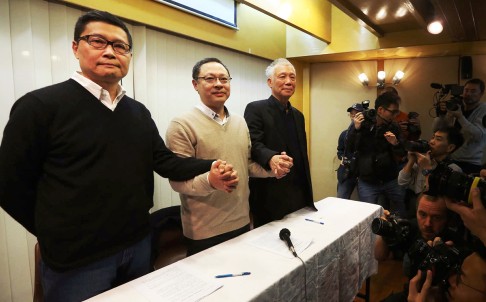
The three co-founders of Occupy Central will today hand themselves in to police, as a police source revealed that more than 200 people had been identified for investigation over the civil disobedience movement.
The Reverend Chu Yiu-ming and academics Benny Tai Yiu-ting and Dr Chan Kin-man plan to report to Central Police Station at 3pm in an attempt to bring a peaceful end to the protests. They also made an open appeal to student-led protesters to retreat.
They will be joined by dozens of Occupy supporters, including Cardinal Joseph Zen Ze-kiun. Media tycoon Jimmy Lai Chee-ying and Democratic Party Founder Martin Lee Chu-ming will wait for the protests to end before surrendering.
Watch: Hong Kong's Occupy co-founders to 'surrender', urge students to retreat
Student leaders have ruled out surrendering yet, though Federation of Students leader Alex Chow Yong-kang said last night it was "only a matter of time" before they gave themselves up. The federation would discuss with protesters how to end the campaign, he added.
Meanwhile a police source revealed that the Occupy trio were on a list for investigation, along with more than 200 others. They include people who clashed with officers during attempts to clear protest camps and people who had incited others to act illegally.
No action had been taken so far because the focus was on clearing the remaining protest camps, the source added.
The Occupy trio made their announcement two days after student leaders escalated the protests with an attempt to blockade government headquarters in Admiralty. The effort was beaten back by police in an operation that saw dozens of arrests and injuries on both sides. The escalation is thought to have forced the trio to bring their plan to surrender forward by two days.
"Our young people have used their bodies to withstand the blows of police batons, their blood and broken bones have brought us the deepest sorrow," Tai said as he read the trio's open letter. "For the sake of the occupiers' safety … we three urge the students to retreat."
Chan said he did not agree that the movement had failed or that its tactics had been naïve.
"If we were naïve, it would be in our naïve beliefs towards 'one country, two systems' and the government's conscience," he said. "It is the government - which refuses to answer."
Chu, a 70-year-old veteran activist, held back tears as he touched on police use of batons, pepper spray and tear gas in an attempt to disperse protesters.
Chan added that Occupy had liaised with the Democratic Development Network, which had pledged to provide subsidies for individuals or groups who intend to promote education on democracy.
"I was very clear about my duty from day one - to lead all participants home safely," said Chu, adding that the protest had veered from its theme of "love and peace" and "we could no longer protect everyone".
Tai dismissed the idea that the three were abandoning those still on the streets of Admiralty and Causeway Bay.
"Our call is out of love to the occupiers," he said, adding that he hoped students would help take the spirit of the "umbrella movement" into the community.
Secretary for security Lai Tung-kwok welcomed the trio's decision and said police would act in accordance with procedures in handling the case.
This article appeared in the South China Morning Post print edition as Police identify 200 for probe
PUBLISHED : Tuesday, 02 December, 2014, 12:53pm
UPDATED : Wednesday, 03 December, 2014, 6:16pm
The government must take responsibility for ending Occupy protests
Frank Ching says being derided for lacking legitimacy does not give the government an excuse to sit on its hands about the protests
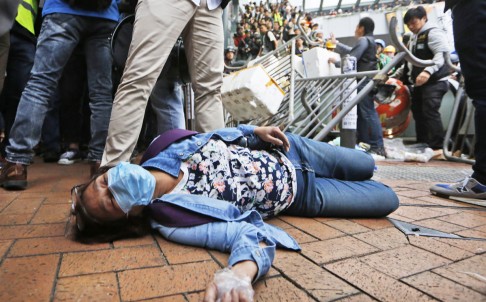
Recent, highly visible examples of police abuse of power are totally unacceptable and potentially dangerous. Without close monitoring by government ministers, there is a danger that the police may become a law unto itself.
Granted, officers have been under great strain ever since the clearance operation in Mong Kok, and they have been battling protesters almost every night into the small hours. This, of course, also makes it clear that while the slogan "Occupy Central" is still used, there is little attempt to ensure that it is done "with love and peace", as promised.
The three original organisers said that the idea was civil disobedience, with participants not resisting arrest but ready to accept the legal consequences of their actions. Now, those carrying out Occupy Central are dressed and armed for battle with the police. Yet, the founders of Occupy Central have not repudiated them. The leaders have turned into the led.
On the government side, there is a similar unwillingness to assume responsibility. The police, we are told, are professionals capable of making their own decisions. In fact, the police should have been brought in to restore order long ago but the government sat on its hands, refusing to govern. In theory, the police entered the scene last week through the circuitous route of acting as assistants to bailiffs enforcing injunctions sought by private parties.
The government, it seems, has relinquished its role of governing and turned it over to the private sector, to the judiciary, to court bailiffs and to their police assistants. Nowhere is the government seen to be exercising leadership. It is not communicating with protesters. It is not mediating with the central government regarding the desires of Hong Kong people. It is not making plans. Steve Vickers, former head of the police criminal intelligence unit and now a security risk consultant, says the government's "quasi-judicial-police approach" is "damaging to Hong Kong's future" and to the judiciary.
While it is understood in virtually all societies that political issues have to be resolved at the political level, in Hong Kong, the judiciary is being used to resolve political problems that the government itself doesn't have an appetite for. This is not separation of powers. It is the executive branch abusing the judicial branch of government. As Henry Litton, one of the original permanent Court of Final Appeal judges and today still a non-permanent judge, said in a recent speech at a law forum, "A civil court process was being invoked for what I feel is a public order issue."
This abnormal state of affairs must end. It is contrary to Hong Kong's interests for the government not to govern. It is flouting thousands of years of Chinese tradition. Confucius taught that everyone has a role in society, with the ruler acting as a ruler and officials acting like officials. When this happens, society is harmonious. Otherwise, harmony is lost.
It is high time for the government to govern again. Just because it is derided by pan-democrats as lacking legitimacy doesn't mean the government doesn't have to do its job. In fact, that should spur it to do an even better job of governing.
Frank Ching is a Hong Kong-based writer and commentator.frank.ching@gmail.com. Follow him on Twitter: @FrankChing1
This article appeared in the South China Morning Post print edition as Restore order
Police to probe more than 200 Occupy protesters as leaders prepare to surrender
As Occupy co-founders surrender with plea for protests to end, source reveals existence of long list of suspects for further investigation
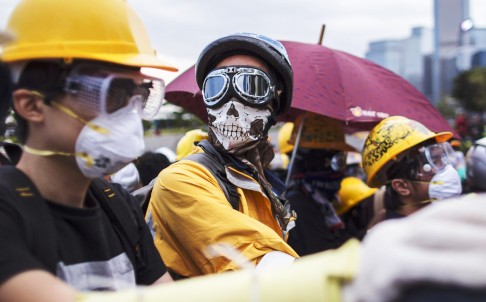
The three co-founders of Occupy Central will today hand themselves in to police, as a police source revealed that more than 200 people had been identified for investigation over the civil disobedience movement.
The Reverend Chu Yiu-ming and academics Benny Tai Yiu-ting and Dr Chan Kin-man plan to report to Central Police Station at 3pm in an attempt to bring a peaceful end to the protests. They also made an open appeal to student-led protesters to retreat.
They will be joined by dozens of Occupy supporters, including Cardinal Joseph Zen Ze-kiun. Media tycoon Jimmy Lai Chee-ying and Democratic Party Founder Martin Lee Chu-ming will wait for the protests to end before surrendering.
Watch: Hong Kong's Occupy co-founders to 'surrender', urge students to retreat
Student leaders have ruled out surrendering yet, though Federation of Students leader Alex Chow Yong-kang said last night it was "only a matter of time" before they gave themselves up. The federation would discuss with protesters how to end the campaign, he added.
Meanwhile a police source revealed that the Occupy trio were on a list for investigation, along with more than 200 others. They include people who clashed with officers during attempts to clear protest camps and people who had incited others to act illegally.
No action had been taken so far because the focus was on clearing the remaining protest camps, the source added.
The Occupy trio made their announcement two days after student leaders escalated the protests with an attempt to blockade government headquarters in Admiralty. The effort was beaten back by police in an operation that saw dozens of arrests and injuries on both sides. The escalation is thought to have forced the trio to bring their plan to surrender forward by two days.
"Our young people have used their bodies to withstand the blows of police batons, their blood and broken bones have brought us the deepest sorrow," Tai said as he read the trio's open letter. "For the sake of the occupiers' safety … we three urge the students to retreat."
Chan said he did not agree that the movement had failed or that its tactics had been naïve.
"If we were naïve, it would be in our naïve beliefs towards 'one country, two systems' and the government's conscience," he said. "It is the government - which refuses to answer."
Chu, a 70-year-old veteran activist, held back tears as he touched on police use of batons, pepper spray and tear gas in an attempt to disperse protesters.
Chan added that Occupy had liaised with the Democratic Development Network, which had pledged to provide subsidies for individuals or groups who intend to promote education on democracy.
"I was very clear about my duty from day one - to lead all participants home safely," said Chu, adding that the protest had veered from its theme of "love and peace" and "we could no longer protect everyone".
Tai dismissed the idea that the three were abandoning those still on the streets of Admiralty and Causeway Bay.
"Our call is out of love to the occupiers," he said, adding that he hoped students would help take the spirit of the "umbrella movement" into the community.
Secretary for security Lai Tung-kwok welcomed the trio's decision and said police would act in accordance with procedures in handling the case.
Watch: Hong Kong student leader Joshua Wong respects Occupy co-founders' decision to surrender
This article appeared in the South China Morning Post print edition as Police identify 200 for probe
Police to probe more than 200 Occupy protesters as leaders prepare to surrender
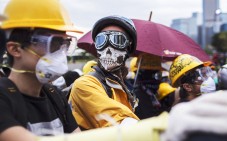
The three co-founders of Occupy Central will today hand themselves in to police, as a police source revealed that more than 200 people had been identified for investigation over the civil disobedience movement.
Why populist democracy is wrong for Hong Kong
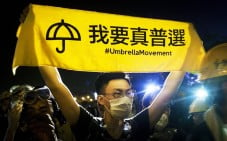
Liberal democracy and populist democracy differ primarily in their conception of liberty. In a liberal democracy, liberty is freedom from constraint in one’s activities, especially constraint by government. In a populist democracy, liberty is the realisation of the “general will” through participation in democratic political processes.
Hong Kong's Legislative Council to tighten rules on outsiders using its facilities
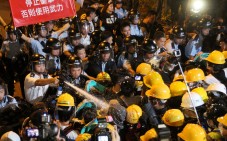
The Legislative Council will impose stricter rules to prevent misuse of its facilities as three lawmakers were handed warning letters for letting student leaders use rooms to direct Occupy protesters.
Original Hong Kong Occupy plan veered off script
Benny Tai planned to launch action in Central, but young protesters ended up taking control in Admiralty and setting up three different camps
PUBLISHED : Wednesday, 03 December, 2014, 4:02am
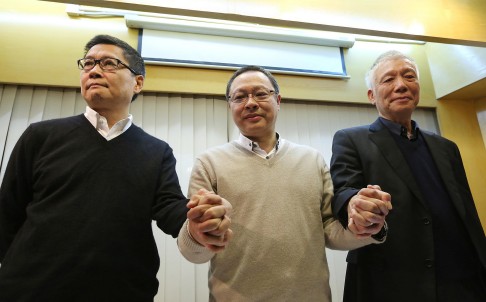
When University of Hong Kong legal scholar Benny Tai Yiu-ting penned his thoughts in a weekly column for the Hong Kong Economic Journal , he expected few readers to pay heed to it.
In the January 16, 2013 article, entitled "Civil disobedience is the most powerful weapon", Tai raised the idea of mobilising 10,000 people to block roads in the financial heart of the city should the central and local governments create a system for the 2017 chief executive election that did not allow a "genuine" choice of candidates.
To his pleasant surprise, the article caught on in the public sphere, laying the groundwork for turning his blueprint into a popular movement.
But today, the Occupy Central protests that Tai launched with conviction on September 28 have deviated markedly from his script - in ways that he and his two co-founders had not imagined in their wildest dreams.
The original plan was to camp on Chater Road in Central for three days from October 1, the National Day holiday. In early September, Tai said they would act on a date that "would cause the minimal damage to Hong Kong's economy".
He also pledged to keep the campaign away from residential districts to avoid harming people's livelihoods.
The first indication that things might get tricky was when members of the Federation of Students and pupil-led protest group Scholarism barged into a forecourt at government headquarters in Admiralty on September 26, irate at being denied a rally at nearby Tamar Park in favour of a pro-Beijing event.
The area, known as Civic Square, had been a popular protest venue until it was fenced off. Scholarism convenor Joshua Wong Chi-fung and several federation leaders were arrested, prompting people from all walks of life to gather at the scene in support of them.
Despite the sudden turn of events, Tai and his fellow Occupy organisers, Dr Chan Kin-man and the Reverend Chu Yiu-ming, initially rejected pressure to start their campaign immediately.
Student activists insisted, however, and the Occupy trio agreed the "era of civil disobedience" had begun.
Noting that 80 per cent of protesters flocking to the main sit-in site of Admiralty were young, the trio acknowledged the student-led nature of the movement and positioned themselves as facilitators and "service leaders".
But the shift in leadership left the campaign less organised than planned. In its early days, a rift emerged between Occupy organisers and the student leaders and concerns were arising that the protests could spin out of control.
Since early October, the Occupy trio have been suggesting that students consider giving up their sites, noting a growing backlash from non-participants affected by the occupation.
But student leaders believed it would be inappropriate to disperse the crowds before the government made any concession on Beijing's strict framework for the 2017 vote.
The occupation wore on, and the patience of Hongkongers wore thin.
Two weeks ago, Chan again urged protesters to consider ending their road blockades and refocus instead on winning long-term support from the public.
Yesterday, Chan and his two co-founders renewed that call as they announced they would turn themselves in to police today.
Tai said the form of civil disobedience they envisaged had changed.
The love and peace that Occupy stood for was overshadowed by an "umbrella movement" that earned its name from dramatic scenes of protesters wielding umbrellas to fend off police tear gas and pepper spray.
"The absolute majority of participants in the protests still adhere to the principle of non-violence," Tai insisted.
He spoke after overnight clashes late on Sunday and early on Monday, during which protesters wearing hard hats and protective masks massed around government headquarters and charged police lines - after student groups called on them to surround the offices. The government strongly condemned Scholarism and the federation.
"When violence erupts, no matter who started it, it is time to consider the transformation of the movement," Tai said.
But he said the government was to blame for the violence because of its failure to respond to protesters' demands.
Dr Ma Ngok, head of Chinese University's department of government and public administration, said the very nature of a mass movement made it difficult to proceed as planned.
"Without the Occupy leaders' promotion of the civil disobedience concept, the 'umbrella movement' would not have happened," Ma said. "But it was not completely unimaginable that the protests would veer from their original expectations."
This article appeared in the South China Morning Post print edition as A plan that went astray
Police let Occupy organisers walk away without charge after they turn themselves in
Movement's fathers and an assortment of supporters are not charged or arrested after turning themselves in at a police station
PUBLISHED : Wednesday, 03 December, 2014, 11:17am
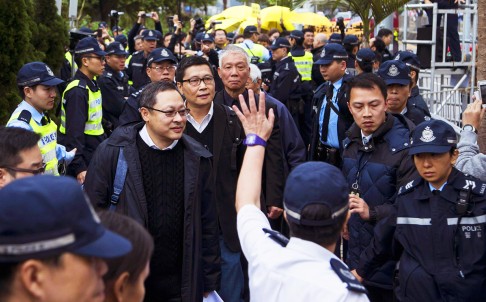
The three co-founders of Occupy Central and more than 60 of their supporters were not arrested or charged yesterday after they turned themselves in for taking part in unauthorised assemblies since late September.
The trio - Benny Tai Yiu-ting, the Reverend Chu Yiu-ming and Dr Chan Kin-man - arrived at the Central Police Station in Sheung Wan with a letter they signed, admitting they had taken part in a rally from September 28 and might have broken laws under the Public Order Ordinance.
Watch: Hong Kong Occupy Central co-founders released without charge after surrendering to police
Through the surrender, the trio aimed to bring a peaceful end to the civil disobedience movement they initiated.
Tai said that during their one-hour stay at the station, police questioned them with a "specially designed" form that listed offences including participating, organising or inciting people to participate in an unauthorised assembly, vandalism and obstructing a policeman's duty.
They were also asked to specify the locations of the alleged offences, such as Harcourt Road or the government's headquarters.
Tai said they admitted only to taking part in an unauthorised assembly.
Accompanying the trio were Cardinal Joseph Zen Ze-kiun, 14 Democratic Party members including lawmaker Wu Chi-wai and former legislators Cheung Man-kwong, and dozens of other Occupy supporters.
Those people also signed a similar letter setting out their personal details and participation in Occupy. Both letters were handed to the police, who took no further action. Police said that by 7pm, 65 people had surrendered.
About 40 anti-Occupy activists gathered outside the venue to hurl insults at them.
Wu was the only lawmaker who surrendered yesterday. Several prominent Occupy supporters - including Edward Chin Chi-kin, founder of the movement's banking group, and Next Media chairman Jimmy Lai Chee-ying, showed up to lend their support but did not turn themselves in, citing timing issues.
Tai said their action marked an end to the civil disobedience they advocated, but that the democratic movement would continue. "I come with peace and hope, as I know there is a bright future for the city's democracy as long as we persevere."
In a sharp contrast to Tai's verdict, Basic Law Committee chairman Li Fei said the Occupy protests would give Hongkongers "a better idea" of the right direction the city's democracy should move towards.
"They should know what is conducive to Hong Kong's long-term prosperity and stability following the recent developments," Li, a top official in charge of Hong Kong affairs, said. "Hong Kong residents will treasure more the Basic Law and the democratic rights enshrined [within]."
Meanwhile, deputy foreign minister Zhang Yesui said, without referring to ongoing clearance efforts at Occupy sites, that Beijing would support Hong Kong government fully to maintain social stability.
"On the road of development, it is inevitable that Hong Kong would run into various kinds of difficulties and challenges," he said in Hong Kong last night. "In no circumstances should [anyone] destroy Hong Kong's rule of law and social order."
Secretary for Justice Rimsky Yuen Kwok-keung reiterated that Occupy "has severely disrupted order in Hong Kong". Deputy director of public prosecutions David Leung Cheuk-yin was tasked with handling Tai's surrender "to avoid any possible perception of bias", because Yuen and chief prosecutor Keith Yeung Ka-hung were classmates with Tai at the University of Hong Kong's law school, the Department of Justice said.
The police said they would handle every case in a fair and impartial manner.
This article appeared in the South China Morning Post print edition as Police let Occupy founders walk away
Hong Kong students vow to continue hunger strike as vomiting and weakness set in
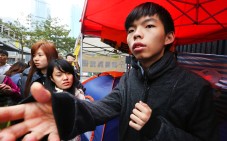
Two more students joined the three Scholarism members already on hunger strike on Wednesday, as the group’s convenor Joshua Wong vowed to continue with their actions despite experiencing tiredness and uncomfortable symptoms.
Politicians and police have done a thorough job of alienating our youth
Gordon Mathews says an incompetent government and, now, the police's use of disproportionate force to clear the protests have radicalised our youth
PUBLISHED : Wednesday, 03 December, 2014, 12:35pm
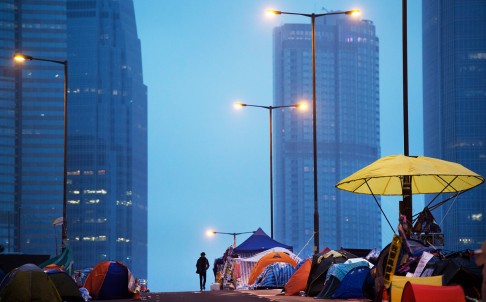
I went to Admiralty on Sunday night, to be with my students after the Federation of Students called for an escalation of protests. I went because the police have on occasion been behaving badly, and I wanted to be a witness to what would happen. Unwittingly, I also wound up protecting my students, only because, when I was there, they felt a need to protect me as an onlooker rather than be on the front lines confronting the police.
The news over the past several days has been full of claims by police and Hong Kong government figures that protesters had become violent. Perhaps a few somewhere were - but, from what I saw over eight hours, the violence was overwhelmingly committed by the police beating students with their batons with great force.
The protesters were indeed engaged in illegal behaviour, occupying roads around the central government complex in an expansion of their earlier protest zones. Some force was probably necessary to clear the roads. But many police were behaving in an out-of-control way, as dozens of videos on television and YouTube attest. This does not compare to police brutality in the United States: we have had no shootings, and I pray this will continue. Hong Kong is still more civil in its behaviour than almost anywhere else in the world. But the police have become politicised, largely because of Hong Kong's political leaders hiding from sight.
Students have shown me their many bruises from being beaten - these aren't radicals, but ordinary students, who in a saner political environment would be at home studying for exams. They may never again see the police as their protectors, but rather as goons doing the bidding of a despised government.
The Occupy Central movement will end soon, although many more demonstrations will take place in the coming months and years. The long-term legacy of the movement will be an ongoing generational chasm. On Hong Kong university campuses, the overwhelming majority of students support Occupy Central and its civil disobedience, although many believe the demonstrations have gone on too long. Almost all students believe the Hong Kong government is run by incompetents who have no understanding of how ordinary people live.
Hong Kong students overwhelmingly see the mainland as a foreign dictatorship rather than a motherland, and see Hong Kong as being progressively swallowed up by its authoritarian mainland masters. This is totally different from what Hong Kong and Beijing pundits envisioned 20 years ago; they assumed young people would become more Chinese. This was not even fully imaginable 20 months ago. A generation has been radicalised.
Will this young generation be running a new, more democratic and open Hong Kong in future decades? Or will it be doomed to suffer an ever more plutocratic and authoritarian Hong Kong? I eye the future with a tiny bit of hope and a great deal of fear for my city. Meanwhile, Hong Kong's political leaders and police officials should know they have completely alienated most of Hong Kong's youth, and will probably never get them back.
Gordon Mathews is professor and chair in the anthropology department at the Chinese University of Hong Kong. His book on Chungking Mansions, in Chinese translation, won the 7th Hong Kong Book Prize in 2014
This article appeared in the South China Morning Post print edition as Lost generation
IN PICTURES: The masked faces of Hong Kong's Occupy protests
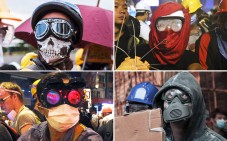
As police announced that they are seeking 200 Occupy protesters for possible prosecution, we take a look at some of the more striking masks demonstrators have donned during the two-month protests, to both protect their identities and fight the effects of teargas, pepper spray and police batons.
Protest strategy should go beyond 'sticking it out'
Manisha Mirchandani says a tactical retreat may revive flagging campaign
PUBLISHED : Wednesday, 03 December, 2014, 12:54pm
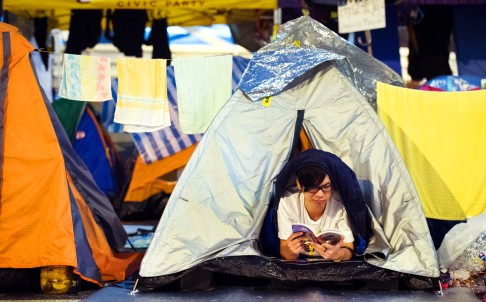
The violent escalation of the Occupy protests in Admiralty and Mong Kok in the past week has been tinged with a sense of exhausted protesters raging against the dying of the light. A risky plan to blockade the central government offices and paralyse activity was deemed "largely a failure", and key student figures such as Joshua Wong Chi-fung are now resorting to a Gandhian-style hunger strike in a bid to draw the government back to the negotiating table.
Squabbling among various factions on strategy, compounded by a lack of gumption by pan-democratic legislators, is giving oxygen to radicals. An ugly, violent end to the protests is looking likely.
When asked why they were still there holding up their umbrellas, despite the bleak forecast, one student summed it up thus: for this generation, there is no other recourse for their voice to be heard.
Hong Kong's young people feel boxed in, and are resorting to desperate measures to be heard. Much of the blame lies at the feet of the leadership, who have neglected to use this to enhance opportunities for the public to participate in decision-making. Valid suggestions for improving representativeness in the nomination committee have fallen on deaf ears.
This is in contrast to trends across the Asia-Pacific, where winds of change are blowing in fledgling democracies such as Myanmar and adolescent ones such as Indonesia. None are faultless, but all acknowledge the importance of giving people a "voice" and of the power of a mandate for elected leaders to make decisions. Like a pressure valve, these mechanisms allow for steam to be released in societies that are complex, messy and often unfair.
The events of the past nine weeks suggest ours has been poorly designed and manufactured. To be fair, Hong Kong protesters have hardly demonstrated a willingness to consider moderate solutions within the parameters of the Basic Law. There is a missed opportunity for our leaders to be brave and forward-thinking within these parameters. And in this spirit, Wong and his supporters must also seize the opportunity to be modern, young and dynamic. They will lose if they continue to protest in a traditional fashion, against conservative forces who always win a numbers game.
Even Wong's courageous hunger strike reinforces a paternalistic narrative that has underpinned the protests, and one that the administration has played astutely.
Along with democratisation in the region, new modes of discourse and communication have risen. Social networks have changed the way information is shared. Protesters here have been innovative in their use of the internet and social media to mobilise support, but less so in their protest tactics which remain outdated, and premised on "sticking it out".
Wong said to his fellow protesters in early November that leaving now would amount to nothing. He was wrong.
At no point has there been serious consideration of a "flash mob" strategy: the threat of being able to mobilise protesters in significant numbers if good faith is broken. As well as minimising disruption to the public, the unpredictability of this tactic has its benefits against a bureaucracy.
Retreating with the strength of agility and the threat of rapid remobilisation is a formidable weapon that the umbrella movement wields, and one which can be used to influence the pace and momentum of the pro-democracy movement. After all, as Wong himself posited, time is on the side of the young protesters.
Born and raised in Hong Kong, Manisha Mirchandani is an independent writer and researcher on development issues in Asia
This article appeared in the South China Morning Post print edition as Protest strategy should go beyond 'sticking it out'
Britain pledges to stop Hong Kong tear gas sales if police use it against protesters again
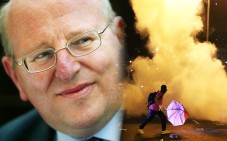
Britain said it would reopen a review into the sale of tear gas to Hong Kong and seek to block exports if it was used again in the territory.
Hong Kong's rule of law has passed the Occupy test - so far
Cliff Buddle says though tested by the illegal Occupy protests and related infractions, the rule of law remains intact in Hong Kong. In fact, it is all the stronger for having weathered the storm so far
PUBLISHED : Wednesday, 03 December, 2014, 5:00pm
Even widespread illegality does not necessarily undermine the rule of law.
The surrender to police by Occupy Central leaders brings their civil disobedience campaign to a symbolic end, almost
two years after it was first proposed. The pro-democracy protests, which they long ago lost control of, still occupy Hong Kong streets. But, as the police continue clearance operations amid waning public support for the protests, we are surely reaching the end of this extraordinary chapter in Hong Kong's history.
two years after it was first proposed. The pro-democracy protests, which they long ago lost control of, still occupy Hong Kong streets. But, as the police continue clearance operations amid waning public support for the protests, we are surely reaching the end of this extraordinary chapter in Hong Kong's history.
There has been much discussion, over the nine weeks of protest, about the impact of the Occupy movement on Hong Kong's rule of law. We have, regrettably, seen violent clashes on the streets, with protesters, their opponents and the police all culpable at times. There has been sustained breaking of the law, through the occupation of the streets, causing businesses to suffer and people to be inconvenienced. And, amid a political deadlock, our courts have been dragged into the affair.
The rule of law has been sorely tested. But I suggest it has passed that test and will, if anything, emerge stronger from these difficult times.
The term "the rule of law" is bandied about as if it only has one meaning. But it is open to different interpretations. Core elements of Hong Kong's rule of law include government power to be limited by the law and the law to apply equally to everyone. There must be adequate legal protection of people's rights and disputes are to be decided freely and fairly by an independent judiciary. There is much more to the concept than simply obeying the law.
Judges in the United Kingdom have disagreed on the question of whether civil disobedience is compatible with the rule of law. It is clear, however, that breaking the law is not, in itself, a threat to the rule of law.
Even widespread illegality need not necessarily undermine it. The occupation of the streets is not the only example of this in Hong Kong. Two years ago, all the talk was of illegal structures in flagrant breach of building regulations. Warnings were issued to 200,000 owners of village houses. Then we have smoking in public places, idling engines, unlawful dumping in the New Territories and illegal parking. While Hong Kong deserves its reputation as an orderly and lawful place, we are no strangers to widespread breaking of the law.
The nature and scale of the Occupy protests presents more of a threat. There was always the danger that prolonged occupation of key parts of Hong Kong would lead to violent clashes. People affected by the protests sought to take the law into their own hands. Opponents - some of them triad gangsters - attacked demonstrators and members of the transport sector sought to remove barriers themselves, sparking clashes. Then, on Sunday, masked men supporting the protests tried to force their way into government headquarters. There have also been examples of police violence and abuse of power.
A widespread breakdown of law and order would threaten the rule of law. But that is not what we have seen. Most of the protesters have remained peaceful. There has been no looting or rampant damaging of private property. It has been possible, for much of the past nine weeks, to stroll through protest sites without feeling unsafe. On the whole, this has been a peaceful form of civil disobedience.
We have also seen Hong Kong's rule of law at work during the protests. There have been many arrests and court appearances for those alleged to have broken the law.
One notable court hearing was that involving Joshua Wong Chi-fung, student group Scholarism's 18-year-old leader, who was freed by a High Court judge after being detained by police for more than 40 hours. The judge granted a writ of habeas corpus, an ancient legal safeguard against arbitrary detention. It was a striking example both of the government being subject to the law and this being enforced by an independent judiciary.
The protests have adversely affected the rights of business owners and others. But the courts have granted injunctions to private parties wanting certain streets cleared. Bailiffs have executed those court orders with the help of the police. While the rights and wrongs of the court decisions are, as always, open to debate, the legal process has followed its course.
The government has largely tolerated the protests, but it seems its patience is now running out. By not moving in earlier to clear the streets, it has allowed views to be aired and the protesters to make their point. Thankfully, fears that the central government would send in the People's Liberation Army to clear the streets have not been realised.
Under the Basic Law, Beijing can apply national laws to Hong Kong if the National People's Congress Standing Committee declares a state of emergency in the city, perhaps as a result of turmoil. However much disruption the Occupy movement has caused, it - rightly - has not been deemed serious enough to fall into that category.
What the Hong Kong government has not done is reach out to the protesters to see if a peaceful end can be achieved through dialogue. There was a televised debate, but this was not sufficient. There is a need for engagement and, indeed, for a much more inclusive approach by the government to constitutional reform if we are to move forward.
The Basic Law, which also brings into play the International Covenant on Civil and Political Rights, seems to envisage a more liberal form of universal suffrage than the one shaped by the NPC Standing Committee decision that sparked the protests. Upholding that promise is also important if the rule of law is to prevail.
The surrender to police of the Occupy leaders may be seen as a political stunt or, perhaps, a genuine attempt to help bring the protests to an end.
But the symbolism is important. Occupy leaders have always said their civil disobedience campaign would involve breaking the law and that they would accept the consequences. This is in keeping with the rule of law, not a breach of it.
Cliff Buddle is the Post's editor, special projects
This article appeared in the South China Morning Post print edition as Test of strength
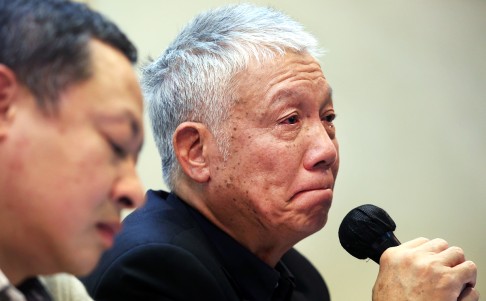


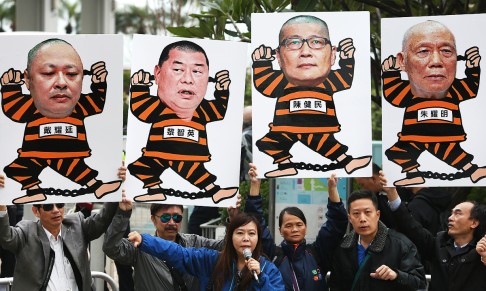
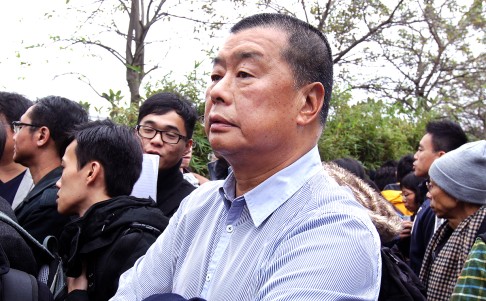
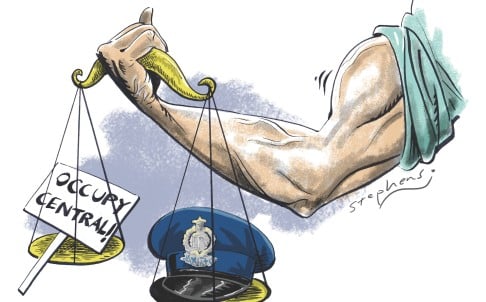
沒有留言:
張貼留言